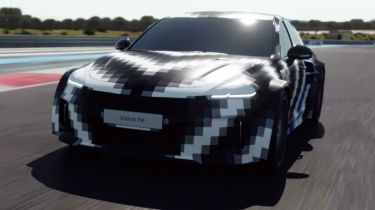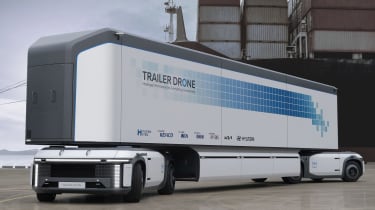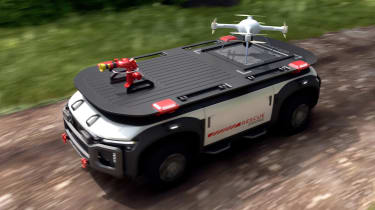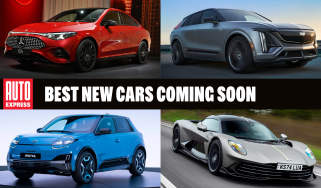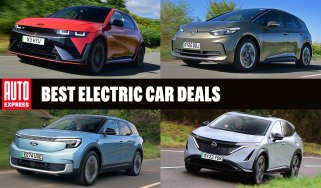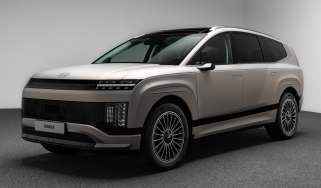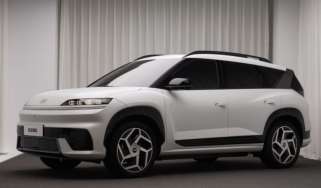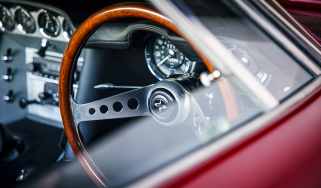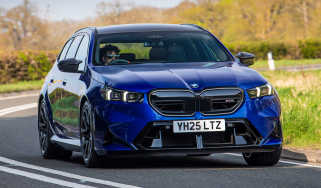Hyundai Hydrogen Wave strategy to yield two new hydrogen fuel cell powertrains in 2023
Hyundai’s Hydrogen wave plans underpin next-generation hydrogen-powered vehicles from the brand; Vision FK hydrogen sports car concept shows the hydrogen future
Hyundai has announced it will launch two new hydrogen fuel cell powertrains in 2023, as part of its mission to popularise the technology by 2040. The announcement was made at Hyundai’s Hydrogen Wave conference, which showcases the firm’s plans to make the tech “readily used for everyone, everything and everywhere”.
The company will offer two versions of its third-generation hydrogen fuel cell stack producing an output of 100kW and 200kW respectively. The former is designed for use in passenger cars (like the current NEXO SUV), while the latter is specifically designed for use in commercial vehicles.
Since the NEXO was launched back in 2018, Hyundai has reduced the size of its 100kW hydrogen fuel cell stack by 30 per cent, which it says makes it easier to apply to a range of different vehicle types. The 200kW unit is also a similar size to the NEXO’s, but offers double the power output.
By 2030, Hyundai aims to produce a hydrogen fuel cell vehicle with a similar price point to a battery electric vehicle, thanks to the improved production efficiencies of its next-generation powertrains. The firm is keen to point out that it has already reduced the cost of the technology over the previous 20 years - by a staggering 98 per cent compared with its prototype fuel cells in 2003.
Hyundai also says it plans to become a leading light in hydrogen-powered commercial vehicles, such as busses and heavy-duty trucks. By 2028, the company hopes to become the first manufacturer to apply the technology to every commercial vehicle sector.
These traditional heavy commercial vehicles will be joined by a new purpose-built vehicle, too, called the Fuel Cell e-Bogie. Essentially, it’s a four-wheeled autonomous subframe, complete with its own hydrogen storage system, which can be hitched to a variety of attachments to perform a range of specialised tasks.
At one extreme, there’s Hyundai’s Trailer Drone which uses two e-Bogies to transport shipping containers around docks. It’ll have a maximum range of 1,000km (around 620 miles) before needing to be refueled.
There are also plans for a hydrogen-powered rescue drone, which uses one e-Bogie fitted with attachments including a fire hose, strobe lights and microcopter. Hyundai says the drone will have a range of up to 500km (310 miles) depending on the terrain and will find particular use in fire-fighting and life-saving missions.
Hydrogen sports car and other uses
And Hyundai won’t stop at that. The company has also unveiled a high-performance hydrogen-hybrid sports car concept, called the Vision FK.
This blends a hydrogen fuel cell with a plug-in hybrid powertrain for a maximum output of more than 500kW (670bhp) and a 0-62mph time of less than four seconds. The Vision FK will also have a maximum range of more than 372 miles.
Hyundai’s final mission is to get its hydrogen fuel cell technology powering our homes and businesses. Its fuel cells are modular and can be stacked together to create a mini power station with an output of one megawatt (or 1,000kW), which the company says would be ideal as an emergency power source for an IT firm.
Hydrogen fuel cells also require significant cooling, and according to Hyundai Motor Group’s executive vice president and head of fuel cell centre, Saehoon Kim, this makes them applicable for use in cargo ships, where sea or river water can be used to cool the tech; shipping is a major contributor to global CO2 emissions, so fuel cell-powered craft could bring big environmental benefits.
Euisun Chung, Chairman of the Hyundai Motor Group, said: “Hyundai Motor Group’s vision is to apply hydrogen energy in all areas of life and industry such as our homes, work-places and factories. The goal is to make hydrogen readily used for everyone, everything, and everywhere.
“We want to offer practical solutions for the sustainable development of humanity and with these breakthroughs, we aim to help foster a worldwide Hydrogen Society by 2040.”
However, as with the early stages of electric vehicle take-up, hydrogen infrastructure around the world is limited.
Auto Express asked Euisin Chung that just as Tesla has helped to accelerate the take-up of electric vehicles by taking some responsibility for the charging network - something that still gives them a competitive advantage today - does Hyundai need to do something similar to accelerate the take-up of hydrogen-powered vehicles?
He told us that “Building a global infrastructure including hydrogen fuelling stations is essential to realise a hydrogen-fueled society. We believe that a close collaboration between private and public sectors is crucial to create global infrastructure for hydrogen charging.
“We’re open to investment opportunities and partnerships in all areas and have recently invested in the H2 Mobility hydrogen refueling network in Germany. We’ll continue to collaborate with other players in the world to accelerate the establishment of hydrogen infrastructure.”
Now read about Hyundai’s plans to stop selling combustion-powered cars in Europe by 2035…
Find a car with the experts

